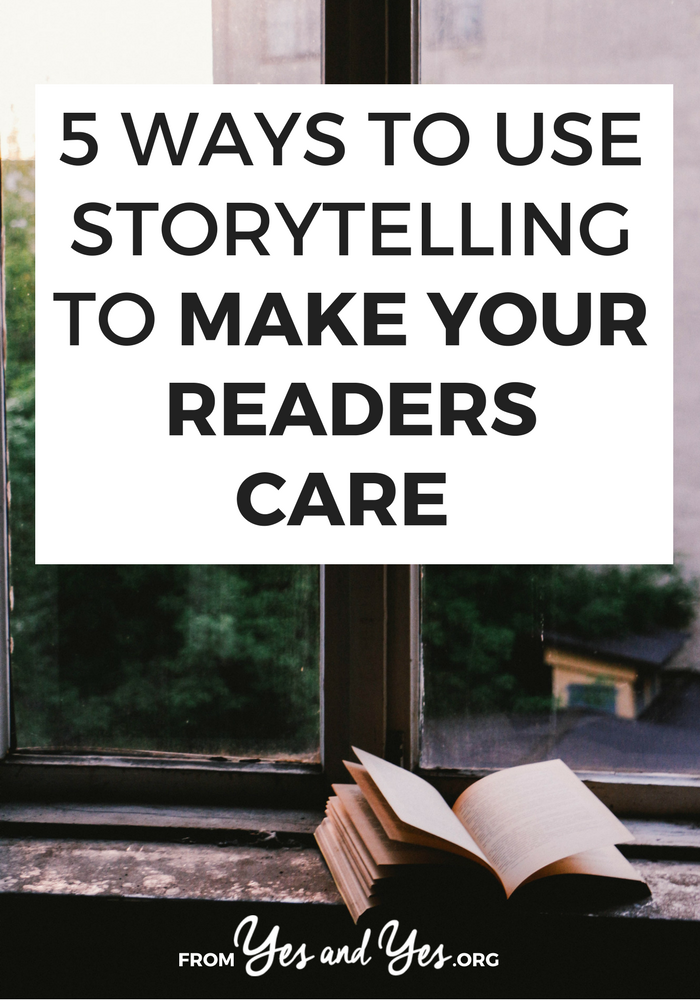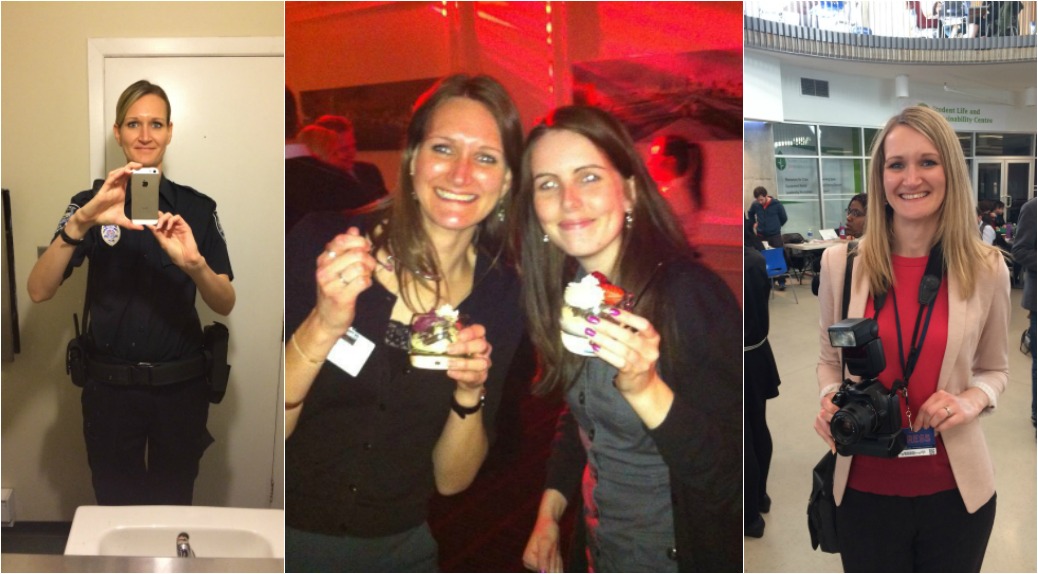
If you read things on the internet, you know how blog posts usually go:
- Introduction that clearly includes SEO keywords
- Numbered list with bolded headings
- Action items you’re encouraged to check off today
I’m not hating! Clearly, that’s pretty much the format we’re using here!
But when we stick to blog-posts-as-usual, it’s hard to make our readers care. It’s hard to emotionally engage with a listicle, ya know?
Today, I brought in storyteller extraordinaire Mike Sowden, to help us write things our readers really, actually care about.
It’s every speaker’s nightmare. I’m standing in front of a sea of expectant faces, every one of them belonging to a blogger, and I’m about to use a word that most of them hate. Like, really hate.
So I start with a story about how I used to hate that word as well, and spend a few minutes talking about how pretentious and annoying it can be. I curl my lip.
I curse (that always gets a good laugh). And then I lead them on my personal journey to enlightenment about what that word really means, trying to convey that sense of woah! when everything clicked and I started seeing the results I wanted for my online business.
That word is storytelling – and it’ll boost your traffic, increase your open rates, and help you sell more stuff than you ever would have believed.
Maybe you’re rolling your eyes now. You’re thinking “storytelling is for kids! Or at least just for fun. Can I have something useful, please?” OK – how about a technique that will increase your blog’s engagement by 300%? That’s storytelling. It’s not just for fun (although it is very fun indeed). And it works.
5 incredibly powerful ways to use storytelling to supercharge your blog
1. Storytellers Hook You Instantly
Newspapers know how to grab you from the first sentence.
“About a month ago, to my embarrassment, I learned I’d been tying my shoelaces wrongly my whole life.”
“This is the moment when, in my dreams, I begin to cry.”
It’s called the lede – a single line that gives you just enough to pull you in, but not enough so all your curiosity is satisfied. It’s the source of all those Upworthy headlines that you find so irritating, but still click on anyway.
It’s why vaguebooking works (“I’ve got something to say but I’m not sure if I should or not?”). It’s also what your favourite novelists do with their first line of each of their books – go take a look.
So – cut to the chase. Give them a taste of the most important thing in your blog post. Give them a reason to keep reading – and watch your post engagement soar.
What you should do next
Devote an extra 10 minutes to crafting an opening sentence designed to grab the reader and hold on tight. Write three different openings and ask a friend which one is most enticing.
2. Storytellers Say The Hard, Scary Things
On the eve of the release of her latest book, blogger Glennon Doyle Melton’s marriage fell apart. This wasn’t just a personal tragedy – it was also a business crisis, because her upcoming book, Love Warrior, was about how to maintain a healthy marriage, using her own as a case study.
In her own words:
“The advice from many is: Wait, G. Just wait till after the book has launched to reveal this. This is a MARRIAGE book – you can’t break up before it even comes out! Glennon – it will affect sales. It will affect your career, your success.
And you will listen to this advice. And you will decide: No.”
That blog post, called “I need to tell you something” (with the lede right there in the title) unleashed a tide of support (and over 365,000 Facebook shares) that propelled her book into Oprah’s Book Club.
Recently, author Torre De Roche found herself in a similar position. Her first book was about finding true love with a rugged Argentinean sailor. Her next book was months away, and her fans were asking “Are you guys still together?” She confessed the sad truth – and her audience rallied around her.
It’s often easy to assume that being honest is business suicide. Good storytellers know better. They know that readers actually want the hard, scary, vulnerable stuff. (Yes & Yes’s True Stories series is a perfect example of that.)
So pour a glass of wine, take a deep breath, and tell it how it really is.
What you should do next
What are you scared to tell your readers? What feels too honest, too candid, too raw? Go into Google and look for someone else who opened up about something similar. Study how they did it and what reaction they got from their readers. What would happen if you did it too? Maybe now’s the time to find out.

3. Storytellers Go Somewhere
It’s no secret that many blogs are assembled on the fly. To those superhuman souls who have their content calendars filled out six months in advance, we, the more scatterbrained, salute you.
But everyone should be giving their readers a destination to look forward to.
Author and blogger Chris Guillebeau calls these quests – personal challenges with a clearly-defined end point – and he even wrote a book about them.
For bloggers, the trick is to make a quest that your readers will also care about, and communicate your progress constantly, along with everything you’ve learned. Think of the plot of a great novel – and how the author keeps you excited about reaching the end of it.
For example, look how SaaS company Groove used their blog to chart their progress towards $10m in recurring revenue.
What you should do next
Think about what your blog is ultimately for, both for you and your readers – and look for a quest that would serve that goal. Then announce you’re totally going for it – and say you don’t know how you’ll get there, but you’ll work it out along the way – and then ask your readers for their advice on what your next step should be!
4. Storytellers Make You Feel Something
Forget facts. If your readers wanted facts, they’d read Wikipedia.
Stories are driven by emotion – and great blogs are as well. Even “How To” posts can be made more engaging by answering “Why To,” somewhere inside them.
Why do you want your blog and/or business to be a huge success? What would that success do for your life? How would it make you feel? Find out and hold onto it, because that feeling is what will drive other people to read your advice, follow your story, and spread the good word about what you’re trying to do for the world.
For example, if you’re sick of hearing people saying bloggers aren’t “proper writers” (a judgment meant to make bloggers feel bad), you’ll love this exasperated post from Geraldine DeRuiter.
What you should do next
What’s a topic that evokes a really strong emotion in you? Write about it – with the aim of making your readers feel the same way you do. Lay out your true feelings. Go all in.
5. Storytellers Know How To End
Every opening-line hook is a promise of delivery.
Every hard, scary post is a promise that things can – and will – get better.
Every quest is a promise you’ll get there some day, taking all your readers with you.
Every emotion-driven message is a promise to your readers that they can trust you with their feelings.
And every ending proves you’re good on your word.
Bloggers seem to be terrified of endings. Why can’t a blog just go on forever? The answer is: all later seasons of Friends. Season 2 of Lost. The Office after Michael Scott left. Your favourite TV show or book series or something else that soooooo outstayed its welcome, or was so Scrooge-like with the answers you wanted, that it became frustratingly boring, stale and ugh.
No, you don’t have to end your blog - but you should try to evolve it. Share on X
Think chapters, seasons, installments in a series. What are you building right now? How will you know when it’s done, and when to move onto the next thing? What does “success” actually look like?
If you nail it down, it actually looks a lot like an ending – and it’s one that you and your readers really care about, so the sooner you get there, the better. When are you delivering that ending to your audience – and what’s the next part of your blog’s exciting story?
What you should do next
Choose a period of time for your blogging – say, three months. Aim to finish something within those three months: a series of posts concluded, a new product launched…something that says to your readers, “onto the next chapter in our story”.
We want to hear from you! Do you use storytelling in your online space? Who do you think does it well?
P.S. Everything I use + recommend to run my business













I’ve actually always used storytelling when blogging. It’s so much more fun to write that way anyway – it’s my own voice!
Charmaine Ng | Architecture & Lifestyle Blog
http://charmainenyw.com
Something I learned online is storytelling goes a long way when it comes to connecting deeper with your target audience. With storytelling, you can pretty much sell anything without directly trying to sell. Why? When readers’ feelings are involved and they develop feelings for your blog and your writing style, they keep coming back automatically and will purchase products & services ‘on the fly’ without asking them to. Am I right? 🙂
You’re right. 🙂 Yes, absolutely. And great sales letters also use this principle. They describe the problem you’re having, but that{s not enough – so then they make you *feel* the problem. (This is sometimes called, somewhat unpleasantly, “twisting the knife.”)
Feelings create trust, and trust is what keeps people coming back until they see something of yours they want to invest in. But it all starts with making them feel something.